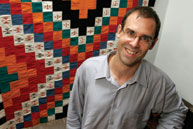Closing the cultural divide

Anthropologist Ronald Niezen
Owen Egan
Professor Ronald Niezen is no stranger to cultural difference. Trained as a social anthropologist, he has done field research with the Songhay in Mali, with several Cree communities in Northern Quebec, Ontario and Manitoba, and with the Sámi people of Northern Finland. Whether it's a local tribal council or an international decision-making body — people are listening to what he has to say.
Niezen — one of North America's foremost experts in aboriginal affairs — was recently appointed to the Department of Anthropology. With nine years of teaching and research experience at Harvard and visiting research positions at Åbo Akademi University in Finland and Berlin's prestigious Humboldt University Institute for European Ethnology, the B.C. native and two-time Cambridge graduate returned home to Canada last year as a visiting professor here at McGill.
"In the U.S., Aboriginal affairs are a harder sell," says Niezen. "Here in Canada, the concerns of indigenous peoples are more publicly acknowledged and their relationship to wider issues in society is more commonly recognized."
After spending years studying the role of Islam in West Africa, Niezen became interested in Canadian aboriginal communities after serving as a consultant to the Cree Board of Health and Social Services of James Bay. While travelling among nine remote communities to examine health care and other social services available to indigenous Cree populations, Niezen began working with the Grand Council of the Crees and Grand Chief Ted Moses.
Before long, Niezen was sitting as an observer-delegate indigenous peoples' lobbying meetings and working groups held by the UN Commission on Human Rights and the World Health Organization in Geneva. He soon realized that something extraordinary was happening in front of him: the emergence of a remarkably successful, transnational lobbying effort on behalf of indigenous peoples worldwide — with Canadian aboriginal groups on the frontline.
"Indigenous groups from Canada have been extremely well-organized," says Niezen. "Because of their experience in the Canadian context, where lobbying efforts and appeals to the public are both encouraged and effective, they have been able to draw world-wide attention to the transnational indigenous peoples' movement."
What might seem like publicity stunts at first glance have actually been carefully orchestrated strategies that have built an international network of individuals and organizations working to promote indigenous rights. At one early indigenous rights meeting in Geneva, the Six Nations delegation informed Swiss authorities that they would be issuing — and traveling with — their own passports. At a later meeting in Amsterdam, the Grand Council of the Crees built a large canoe and paddled along the city's trademark canals to attract support. In a campaign to stop the Great Whale hydro project in northern Quebec in the mid-1990s, aboriginal leaders met with everyone from community groups to local politicians to garner support for their cause. And, according to Niezen, it worked. In the past two decades the indigenous peoples' movement has forced states and international organizations to re-evaluate their treatment of distinct cultural groups within their borders.
Niezen's work on indigenous lobbying efforts for collective human rights and self-determination — both within Canada and internationally — has far-reaching implications for all kinds of identity groups. His latest book — A World Beyond Difference — examines the relationship between cultural difference and globalization. Niezen challenges accepted ways of thinking, arguing that globalization has been going on for centuries and that both the erasure of cultural differences and the reassertion of distinct cultural identities are, paradoxically, part of the same process.
Closer to home, Niezen is working with the McGill Institute for the Study of Canada to create a native studies component within the undergraduate Canadian studies program. His experience with indigenous populations — from the challenges faced in individual communities to the global struggle for recognition and self-determination — will help students grapple with the complexities of multiculturalism.

